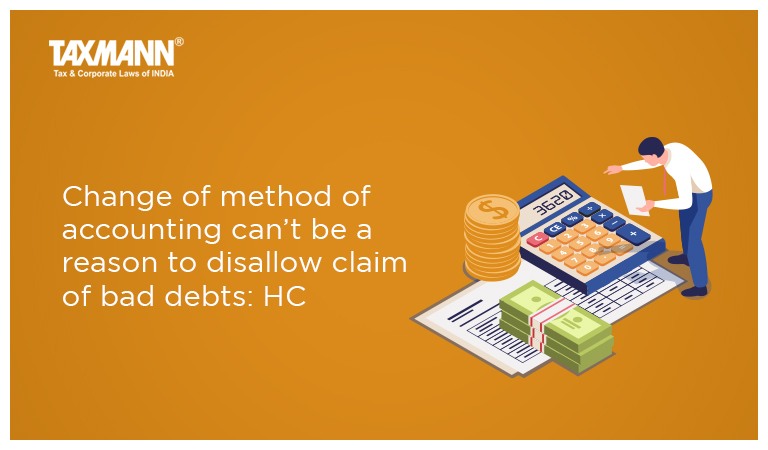Change of method of accounting can’t be a reason to disallow claim of bad debts: HC
- Blog|News|Income Tax|
- 2 Min Read
- By Taxmann
- |
- Last Updated on 27 July, 2022

Case Details: L.K.P. Merchant Financing Ltd. v. DCIT - [2022] 140 taxmann.com 548 (Bombay)
Judiciary and Counsel Details
-
- Dhiraj Singh Thakur & Abhay Ahuja, JJ.
- Ms Dinkle Hariya, Ms Rashmi Vyas & Vipul B. Joshi for the Appellant.
- Vikas T. Khanchandani for the Respondent.
Facts of the Case
Assessee was a Public Limited Company registered as a Non-Banking Finance Company. It was engaged in the business inter alia of lease finance. It entered into a lease agreement with a Company (lessee), to transfer the right to use by way of lease of certain equipment.
The first installment of the lease amount was received by the assessee. Further installments due were also accounted for as income in the respective years, as per the mercantile system of accounting although the lessee defaulted in payment of further installment.
In view of default in payments, the assessee wrote off the amount as bad debt. However, the Assessing Officer (AO) didn’t allow the said claim. It was observed that since the assessee was maintaining the mercantile system of accounting if such reversal was allowed, it would be a clear violation of the method of accounting adopted by the assessee. The dispute reached the Bombay High Court.
High Court Held
The High Court held that it was recorded in the order of the Commissioner of Appeals that the lessee company had become a sick company. The prospects of recovery of lease rentals were quite bleak and the assessee considering that the same could not be recovered in the foreseeable future decided to write off a debt as bad debt.
It is nobody’s case that the assessee had not complied with the provisions of Section 36(2). The assessee took a business decision to write off the debt as a bad debt. A wise businessman would not want to spend good money on litigating for a bad bargain. Having taken the commercial decision to write off the debt as a bad debt based on the material, cannot lead to a conclusion that the decision was not bona fide.
The lease rentals were offered as income by the Appellant on mercantile basis had become bad and the assessee decided to write it off and did write off the same in its books of accounts in terms of the amended Section 36(1) (vii).
Further, a change of the method of accounting by the assessee from mercantile to cash may even be a breach of the accounting principles. However, that is not a requirement of Section 36(1)(vii) of the Income Tax Act for allowing a debt as a bad debt.
Disclaimer: The content/information published on the website is only for general information of the user and shall not be construed as legal advice. While the Taxmann has exercised reasonable efforts to ensure the veracity of information/content published, Taxmann shall be under no liability in any manner whatsoever for incorrect information, if any.

Taxmann Publications has a dedicated in-house Research & Editorial Team. This team consists of a team of Chartered Accountants, Company Secretaries, and Lawyers. This team works under the guidance and supervision of editor-in-chief Mr Rakesh Bhargava.
The Research and Editorial Team is responsible for developing reliable and accurate content for the readers. The team follows the six-sigma approach to achieve the benchmark of zero error in its publications and research platforms. The team ensures that the following publication guidelines are thoroughly followed while developing the content:
- The statutory material is obtained only from the authorized and reliable sources
- All the latest developments in the judicial and legislative fields are covered
- Prepare the analytical write-ups on current, controversial, and important issues to help the readers to understand the concept and its implications
- Every content published by Taxmann is complete, accurate and lucid
- All evidence-based statements are supported with proper reference to Section, Circular No., Notification No. or citations
- The golden rules of grammar, style and consistency are thoroughly followed
- Font and size that’s easy to read and remain consistent across all imprint and digital publications are applied



 CA | CS | CMA
CA | CS | CMA
